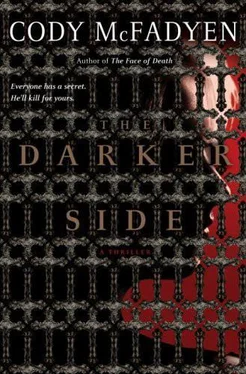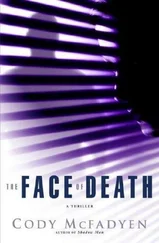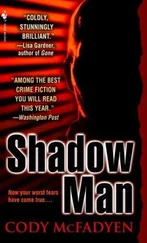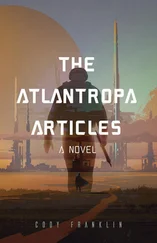Lights are on in the hangar, big and bright. The late hour and the stark utility of the place combine with the cold to create a feeling of solitude.
"Guess we're supposed to just drive right in," Alan mutters, and does so.
"Who's that?" Callie asks as we pull up.
We're being met by a blonde woman I've never seen before. She's about my age, and she's wearing a black jacket, black slacks, and a white shirt. Simple, but it fits her too well to be off-the-rack. She's neither tall nor short, about five-five, pretty without being beautiful. Her face, which is a study in blankness, frames intelligent blue eyes.
"Smells like an exec to me," Alan mutters.
She walks right up to me as I get out of the car. "Agent Barrett?"
"Yes? And you are?"
"Rachael Hinson. I work for the Director."
"Okay."
"You have the plane for up to twenty-four hours," she says, skipping any preamble. "No one will be allowed in this hangar until then. You won't be bothered." She points to a rolling cart near us. "Forensic field kits are there, including cameras, evidence bags, and the file created by the police before we took over. I'll be supervising."
I thought this might be coming.
"No," I say, keeping my voice mild.
Hinson turns to me with a frown. "I'm sorry?"
"I said no, Agent Hinson. This is my investigation. My team and I will be the only ones on that plane."
She steps close to me, very close, using her height advantage to try and intimidate me. It's a smart move, but an old move, and I'm unfazed.
"I'm afraid I'll have to insist," she says, glaring down at me with those blue eyes.
She's fairly scary looking, I'll give her that.
"Call the Director," I say.
"Why?"
"Because he's the one who can resolve this. This isn't a power play, Hinson. Okay, maybe it is a little. But the truth is, you'll just be in the way, and your motives for being there would be a distraction. We don't need someone looking over our shoulders right now."
She doesn't so much step back as shift her weight onto her right leg. I can see her considering what I'm saying, weighing whatever directive she'd been given regarding keeping an eye on us against the wisdom of bugging the Director. She's not worried, she's thinking it through. Hinson is used to exercising her own discretion.
"Look," I say, to help her along, "You know I'm not here just because the Director ordered me to be."
"Functionally, you are."
"Functionally, but not actually . I'm here because the congressman's wife asked for me."
The smallest of smiles ghosts her lips, a slight softening of that all-business blankness. It's a smile of respect, an appreciation of my not-so-subtle name-dropping.
"Fine, Agent Barrett," she says, stepping back now. She reaches into her inside jacket pocket, giving me a glimpse of a weapon held by an under-the-armpit shoulder holster. She produces a simple white business card and gives it to me. The card says: Hinson in black type, followed by a phone number and e-mail address. Nothing else. I glance at her. "We're into brevity, I see."
She shrugs. "I can count on two hands the number of times I've handed that card out. Please call if you need anything. You can reach me twenty-four seven."
She turns and walks off without another word, pumps clacking against the cold gray concrete of the hangar.
Round one to me, but I remember AD Jones's warning and I'm sure now he was right to give it.
"Hm," Alan rumbles, "how do you describe someone like that?
Scary? Tough? Both?"
"Describe her as she lives to be," I murmur.
"Which is?"
"Useful. Useful is her higher power. Now let's check out our crime scene."
"I'VE NEVER BEEN ON Atotally empty plane before," Callie says. "It's odd."
"Too quiet," Alan observes.
They're right. Under normal circumstances, planes have their own noise, a kind of murmuring crowd sound. This one is a tomb.
"What is this, a seven twenty-seven?" Alan asks.
"This is a seven thirty-seven eight hundred," James replies.
"Medium-sized, narrow body, seats one hundred sixty-two passengers in a two-class layout-which is what this plane has. It's one hundred twenty-nine feet long with a wingspan of a hundred twelve feet. It weighs ninety-one thousand pounds empty, can travel over three thousand nautical miles fully loaded, and has a cruising speed of roughly mach point seven."
Alan rolls his eyes. "Thanks, Encyclopedia Brown."
"Where was she seated?" I ask.
Alan consults the file. "Twenty F. Window seat."
I frown. "One question to ask: How did he ensure he had a seat next to her? That requires prior knowledge of her seating arrangements. We need to find out how she booked her flight."
"There are too many variables here," James says. I glance at him. "Meaning?"
"Look, the way he killed her required that she have a window seat."
He pulls the file from Alan's hands and removes a photograph. "He left her leaning up against the window, with a blanket pulled over her, like she was asleep. He wouldn't have been able to do that if she was sitting in the middle seat, much less an aisle."
"So?"
"My point is, there's various ways he could have found out what her seating assignment was. He could have bribed someone, or hacked into the system. From there, he could have requested the seat next to hers, or talked the person who was originally supposed to sit there into giving it up to him, any of a number of things. But post nine eleven, there's virtually no way he could have guaranteed she'd have gotten a window seat. No way to plan or arrange that."
I understand now what James is saying. "Killing her on the plane wasn't a given."
He nods. "Right."
It's a tiny thing, but, as always, it is a piece of the overall puzzle, a part of seeing the man who did this.
He started out with the decision to kill Lisa Reid, not the decision to kill her on a plane. He stalked her, watched her, gathered information about her life. He found out she was going on a trip, found out somehow that she had gotten a window seat, and only then planned and arranged killing her here. If events hadn't fallen into place the way he needed them to, he would have killed her somewhere else.
"Location interested him," I murmur, "but it was an aside, a novelty, a 'see what I can do.' She was the most important factor, not the location. Lisa was the key."
"Wait," Callie says. "There's another possibility, yes?"
"Which is?"
"That it was a random killing. Perhaps the location was the key factor for him. He got himself a middle seat and planned to kill whoever was unlucky enough to be sitting next to him, and that just happened to be Lisa. Maybe he has a problem with this airline, or air travel in general. I've wanted to kill off an obnoxious fellow passenger myself once or twice."
"Possible and definitely disturbing," I allow, "but unlikely. The fact that it was Lisa Reid-transgendered person and offspring of a congressional family?" I shake my head. "That's not a coincidence. He likes planning and control. Victim choice would be an integral part of that. I could be wrong, but. . this doesn't feel random to me."
Callie considers this, nods in agreement. "Point taken."
We move down the single aisle. The 737–800 has the classic seating arrangement, rows of three seats on either side. The air is cool but not cold yet. Airplanes hold heat well. We arrive at 20F.
"How far did their Crime Scene Unit get, Callie?" I ask. She flips through the file. "Full photographs, with good coverage both before and after removal of the body. They collected her luggage, which is down there in the hangar. That's about it."
"Someone jumped on this one fast," Alan observes. I take a moment and look. Nothing fancy, nothing psychic. This is it, right here, the place where one human being murdered another. A life ended in that seat by the window. If you believe in the soul, and I do, this is the location where the essence of the who of Lisa Reid disappeared forever. I'm struck, as always, by how inadequate the location of death is when compared to the truth of death itself. I saw a pretty young woman once, staked out in the dirt. She was naked. She'd been strangled. Her tongue lolled from her swollen, beaten mouth. Her open eyes stared at the sky. She still had some of her beauty, but it was fading fast, being eaten around the edges by the coming entropy. Dead as she was, she still put the dirt to shame. There was no forest, no ground, and no sky, there was only her. No canvas exists that can really add to an ended life; death frames itself.
Читать дальше












